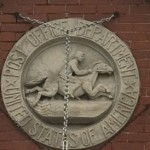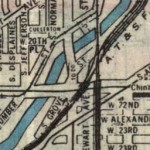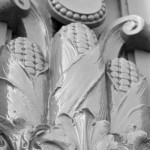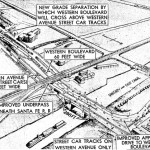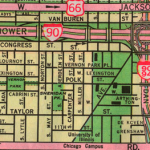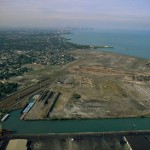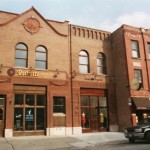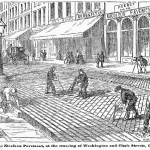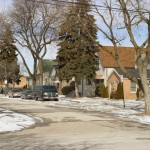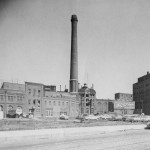
Articles
Bridgeport’s Chicago & Alton Railroad Bridge
by Patrick McBriarty » 10.23.2014 One of the most unique bridges in Chicago still carries train traffic through the Bridgeport neighborhood. The history of the Chicago & Alton Railroad Bridge is intricately woven into the story of the neighborhood, the growth of the city, and the development of the Illinois & Michigan (I&M) Canal and the railroads as Bridgeport and Chicago became a key junction and national center for trade, transportation, and commerce. Read More » Five Years of Forgotten Chicago, Part 2: Research
by Patrick Steffes » 12.6.2012 Since Forgotten Chicago’s modest beginnings as a web site in November 2007, we have prided ourselves on the depth of our extensive research on the Chicago area’s overlooked built (and unbuilt) environment. In addition to writing articles, giving presentations, and conducting tours, Forgotten Chicago recognizes that an enormous amount of little-known yet invaluable information on Chicagoland history and development to date has never been cataloged, digitized, or made easily accessible to researchers (including us). Read More » Five Years of Forgotten Chicago, Part 1: Tours
by Staff » 10.23.2012 In October 2012, Forgotten Chicago concluded its fifth season of tours, having shared with over a thousand participants some of the Chicago area’s most overlooked, little known, and remarkable sites, most hiding in plain site, and nearly all unexplored in depth by any other organization. Read More » Review of FC175, Our Chicago Birthday Party Held March 31, 2012
by Staff » 4.8.2012 Many thanks to everyone who attended FC175 on Saturday, March 31, 2012 at Greenhouse Loft. We hope attendees had as much fun at our event as we had putting it together! If you were unable to attend, we hope you enjoy this summary of the event. Read More » Chicago Motor Club Building
by Serhii Chrucky » 5.3.2011 The Chicago Motor Club building was designed and completed within 265 days in 1928 and opened January of the next year. Having been granted National Register status in 1978, the building is widely regarded as one of Chicago’s finest Art Deco style skyscrapers. Read More » Sidewalk Stamps
by Serhii Chrucky » 8.24.2010 Sidewalk stamps can be found on the streets of American cities large and small. These ubiquitous inscriptions are the proud commemorations of a job well done, as well as a practical and long-term form of advertising. Read More » Neonlicht
by Jacob Kaplan and Serhii Chrucky » 12.9.2009 As the Kraftwerk song goes, Ist diese stadt aus licht, although not all lights are made equal, and in 2009 — cities, especially ours, are becoming more and more devoid of the unique light. Read More » Bygone Breweries
by Jacob Kaplan » 8.20.2009 Unlike neighboring Milwaukee, Chicago has never been known as a center of brewing. This is not to say it wasn’t a sizable local industry. Read More » Long Lost Loop Lanes
by Serhii Chrucky » 7.1.2009 It’s an odd practice, the commemorative naming of streets. Those who have influence over the naming of streets, the wealthy and powerful, are the most commonly commemorated. Read More » Pony Express
by Jacob Kaplan » 6.15.2009 Next time you’re waiting in an interminably long line at a Chicago post office, take a look around. If you’re in an older neighborhood of the city, you’ll likely be standing in an Art Moderne-style Works Progress Administration (WPA Moderne) building Read More » Harms Park
by Corinne Aquino » 1.17.2009
Grove Street
by Serhii Chrucky » 1.11.2009
Old Edgebrook
by Jacob Kaplan » 1.10.2009 Old Edgebrook is a neighborhood that truly belies its urban setting. Though this tiny enclave in the woods has been part of Chicago since 1889, it still feels as though it is miles away from a city. Read More » St. Ignatius Architecture Graveyard
by Serhii Chrucky » 1.10.2009
South Western Avenue Improvement
by Jacob Kaplan » 1.8.2009
The Last Days of Washburne
by Serhii Chrucky » 1.8.2009 Recently, an 11 acre expanse of vacant land was created in Little Village. The Liquid Carbonic factory turned Washburne Trade School has been demolished, following more than a decade of vacancy. Read More » The Little House on Polk Street
by Serhii Chrucky » 1.8.2009 Though its eastern border is now Morgan Street, the neighborhood of Little Italy once continued east along Taylor Street all the way to Canal Street. Read More » Fire Insurance Patrol Stations
by Jacob Kaplan » 1.8.2009 The Chicago Fire Department is well known for obvious reasons, however, for a long while it was not the only company in town. Read More » South Works
by Jacob Kaplan » 12.28.2008 Along Lake Michigan on the Southeast Side of Chicago lies a huge empty tract of land. Read More » Disused Fire Stations Part 1 – 19th Century
by Jacob Kaplan » 12.23.2008 In terms of municipal architecture, firehouses are probably the most recognizable. In Chicago, they have almost always been designed as attractive buildings that fit in with their surroundings, becoming neighborhood landmarks. Read More » Disused Turnarounds
by Jacob Kaplan » 12.23.2008 Although Chicago’s once world-class transportation infrastructure has been downsized over the years, many remnants of the past still remain. Read More » The Northern Indian Boundary Line
by Jacob Kaplan » 12.23.2008 What do Rogers Avenue and Forest Preserve Drive have in common? They both follow an old Indian Boundary line. Read More » Olde Western Avenue
by Serhii Chrucky » 12.23.2008 Olde Western Avenue, complete with extra ‘e’, is a former alignment of Western through Blue Island. Read More » Disused Police Stations
by Jacob Kaplan » 12.13.2008 Chicago’s police stations have not been widely known as architectural treasures, let alone as anything out of the ordinary. Read More » Schoenhofen Brewery
by Serhii Chrucky » 12.13.2008 Although a significant amount of it has been lost, what remains of the Schoenhofen Brewery are still the most impressive pre-Prohibition era brewery structures in Chicago. Read More » Old Addresses
by Corinne Aquino » 12.13.2008 ‘Old Addresses’ refer to pre-1909 numbering systems. Before Edward Brennan developed and implemented a comprehensive system, three different systems existed, one for each ‘division’ of the city. Read More » Old Telephone Numbers
by Serhii Chrucky » 12.13.2008 This page focuses on the variety of old telephone numbers that begin with two and three letter prefixes. Read More » Wood Block Alleys
by Serhii Chrucky » 12.13.2008 Modern day Chicago’s streets and alleys consist primarily of asphalt pavement. Numerous examples in older parts of the city can still be found paved with Belgian block from the late 19th and early 20th century. Read More » Expressway Parks
by Jacob Kaplan » 12.12.2008 In the 1970s, Chicago and the State of Illinois embarked on a plan to place parks on undeveloped land remaining after the creation of the expressway system. Read More » Public Bath Houses
by Jacob Kaplan » 12.12.2008 Chicago used to be a much dirtier place. This was especially true in the poor immigrant areas surrounding the Loop. Read More » B&O’s Original Chicago Entry
by Jacob Kaplan » 12.12.2008 On the Southeast Side, a long abandoned grade level railroad line lives on in the gentle rise of the streets it once crossed. Read More » To 90 or 290?
by Serhii Chrucky » 12.11.2008 The four signs below are located in Lawndale and all refer to the Homan avenue entrance to the Eisenhower expressway. Two of them are on Douglas boulevard, one on Jackson boulevard, and one on Homan itself. Read More » The Municipal Device
by Jacob Kaplan » 12.10.2008 Chicagoans seem to have a lot of civic pride. The most prominent example of this is the municipal flag, flown all over the city by public and private institutions alike. Read More » Lake Shore Drive Redux
by Serhii Chrucky » 11.22.2008
Tiny Streets
by Serhii Chrucky » 11.22.2008 Have you ever wondered which of Chicago’s streets is the shortest? How about the fourth shortest? You’re in the right place. Read More » 312 ’72
by Serhii Chrucky » 11.22.2008 In order to begin this, our first “street necrology” page for this site, we needed a physical constraint. The current boundaries of the 312 area code were chosen as an arbitrary border Read More » |














